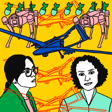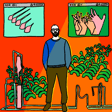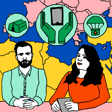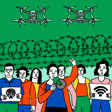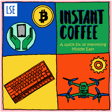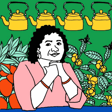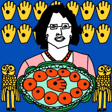Become a Creator today!Start creating today - Share your story with the world!
Start for free
00:00:00
00:00:01

1.8. Resistance politics during a global pandemic with Ghiwa Sayegh
On this episode of Instant Coffee, Sara Salem talks to Ghiwa Sayegh about resistance politics during a global pandemic. Ghiwa Sayegh is a feminist writer and researcher. She is editor-in-chief of Kohl, a journal for body and gender research produced in Beirut, Lebanon. We recorded this episode on the 3rd of August 2020, a day before the explosion in Beirut. We decided to release it as is because we believe it provides a good framework for understanding what led to the explosion. Website: kohljournal.press/ Twitter: @kohljournal, @feministswrite
Transcript
Introduction to the Podcast
00:00:00
Speaker
The question of why is there no alternative for me is because we are being deterred from organizing in this way. We look at alternatives as things or projects that are big enough to match the magnitude of the system. But what was proven to us during street revolutionary time is that we cannot match the magnitude of the system. But the way we choose to organize and work with each other is practicing alternatives.
00:00:31
Speaker
This is Instant Coffee, a new podcast brought to you by the LSE Middle East Center and produced by me, Nadine Almanaspi and me, Rivalle Sleiman Haydar.
Resistance Politics during a Pandemic
00:00:42
Speaker
On this episode, Sarah Salim talks to Riva Zaire about resistance politics during a global pandemic.
00:00:50
Speaker
Sarah is an assistant professor in the department of sociology at LSE. Riawa is a feminist writer and researcher. She is the editor-in-chief of Kahul, a journal for body and gender research produced in Beirut, Lebanon. We recorded this episode on the 3rd of August, a day before the explosion in Beirut. We decided to release it as is because we think it provides the good framework to understand what led to the explosion. Over to you, Sarah.
00:01:17
Speaker
Okay, hi everyone. I'm really excited to be having this conversation with Riva, who's an amazing feminist scholar-activist based in Lebanon. And we're basically going to talk a little bit about her work, about the contemporary context, and about hopefully lots of other things.
00:01:38
Speaker
So I thought that we could get started by speaking a little bit about the moment that we find ourselves in, which is both kind of a very particular moment globally, but also a very particular moment in the context of Lebanon.
Lebanon's Economic Crisis and State Dynamics
00:01:53
Speaker
So I wondered if you could speak a little bit about the intersection between kind of economic crisis, particularly in Lebanon, as well as kind of the global pandemic,
00:02:05
Speaker
were facing and kind of the rise of resistance politics, which of course was already taking place in Lebanon before the pandemic and I guess has continued in some ways. Hi Sarah, it's great to have this conversation with you.
00:02:21
Speaker
And I'm glad that we are finally able to have this conversation. It's quite fitting to what we are talking about today, but we've had to move recording this due to electricity cuts in Lebanon. So maybe a good starting point for this is to really talk about affect.
00:02:41
Speaker
in the way you know it affects us like in terms of despair, entrapment, existential questions and then what this does in turn to our idea of a resistance project or resistance politics in general. Obviously we are living a global pandemic that is further reducing mobility
00:03:03
Speaker
But also particularly in the case of, you know, the nation state, Lebanon and other contexts as well, what we are witnessing is complete economic collapse that has translated in hyperinflation, blackouts in terms of electricity, but also like the Internet, a famine, loss of jobs. And this all goes back to the, you know, the banking or economic
00:03:31
Speaker
strategy of plugging local currency usually from the global south to the dollar that eventually leads to collapse and devaluation because of global politics mostly.
00:03:45
Speaker
And what we also witness is, you know, this idea of banks suddenly showing themselves as insiduously ruling the economies that we navigate on a daily basis.
Critique of Nation States and Capitalism
00:03:58
Speaker
And so for me, what this does at a moment like this one is to make me think about the tenacity of the project that we have come to know as nation states.
00:04:10
Speaker
And for me, this project is about power. It's about capitalist profit. It's about maintaining the interests of the few, the way we have seen in Lebanon. So when we as activists, as people on the left, when we speak of the state's failure, quote unquote, to do its job, what we are doing is taking this job at face value. It's assuming
00:04:37
Speaker
that a state's job is the well-being of citizens, quote-unquote citizens, who adhere to a nationalist notion of citizenship in exchange of something else, like housing, health care, pension, decent living, et cetera. So what we are trying to do is to hold the state accountable on these fronts. But if we go back to look at it from a very, like, from a capital point of view, you know, from that
00:05:06
Speaker
perspective, nation states are a successful project.
Impact of Pandemic on Protests
00:05:10
Speaker
And even in the case of Lebanon, even in the case of total collapse, this project is working in maintaining the interests of the few again and again. I don't want to treat all nation states as one and the same. In fact,
00:05:27
Speaker
As we are living, as part of our daily realities right now, the economic sanctions and collapse in many global south contexts are no short of an economic war that we are living and that are being played at this level of livelihood affecting people's realities and material struggles.
00:05:49
Speaker
But what I'm trying to say here in terms of the point I'm making in terms of nation states is that resistance politics ultimately are about failing at being assimilated into this structure. And maybe this is kind of, you know, it reminds me a bit of the notion of queer failure.
00:06:09
Speaker
And what kind of vision and alternatives are we looking at or we are looking into? For me, it's an alternative that is queer, that is non-sectarian, that is anti-racist, that does not understand the punitive system as accountability, and that is globally about dismantling those institutions, such as the police, the banks, in the way that we know them right now.
00:06:39
Speaker
Or maybe to tie it a bit with what we have lived in Lebanon in the past year. In a lot of ways, when we talk about resistance or revolution, we look at a moment, and in the case of Lebanon, we look at the beginning of it as October 17, we look at the end of it,
00:06:58
Speaker
as the moment protests stopped happening in a way that is regular in the public sphere.
Challenges of Online Organizing in Lebanon
00:07:04
Speaker
And so with the intersection of global pandemic, of economic crisis, of how is it that we organize what this intersection does to our understanding of resistance politics,
00:07:17
Speaker
is about it becoming a praxis in the way we receive and navigate these intersections. And so resistance politics are, in a lot of ways, what we do together when we are not visible, how we treat each other,
00:07:35
Speaker
And what kind of solidarity and accountability do we try to build in preparation of the alternative worldview that we are working with and towards?
00:07:48
Speaker
Yeah, thank you for all of that. I think that you touched on so many important dimensions of both what's happening in Lebanon and what's happening globally. And I especially liked your point about failure, but also thinking about a different horizon. And I think that that's something we're seeing across the world around these discussions of abolition as also the presence of something new. And I really like that.
00:08:14
Speaker
I think also a lot of these themes come up a lot in your work and you've done, you know, so much in terms of engaging with these questions politically, academically and so on. And so I was wondering if you could talk a little bit about how the current pandemic has had an effect on the ways in which you work. So, you know, it's obviously kind of had an effect on how we all move, how we all communicate, work, and especially how we might organize.
00:08:42
Speaker
So I wanted to ask if you could talk a little bit about how what this has meant for your work and your organizing. Do you see a
Transnational Movements and Their Potential
00:08:51
Speaker
shift in terms of how the physical and imagined borders operate at this moment, especially in terms of more transnational collective action and struggle?
00:09:01
Speaker
I think there is definitely a shift in the sense that what we have known about online embodiment is now being brought to the surface in a way that is pronounced.
00:09:15
Speaker
And obviously there's the idea of mobility, but I would also like to keep connecting the global pandemic to the economic situation, because of course we would like to move part of our work online, but this has been complicated by different forces that are working against this kind of transnational organizing in different ways. I've spoken a bit about
00:09:39
Speaker
The electricity slash internet blackout, but I have a small, small anecdote here at the very beginning of the pandemic when we were under total lockdown.
00:09:50
Speaker
we wanted Escohal to have a Zoom account so we could hold a lot of our meetings online. And so when I tried to buy an account with the bank card that we had for Escohal, it just would not accept it. And so when I called the bank and eventually got a hold of them, what they told me was that actually they are no longer allowing
00:10:16
Speaker
institutional cards that are new like that are recent to do any transaction that is international and so it was impossible for us we still do not have a zoom account and we have been relying on solidarity of you know our board members or collaborators that's just one example another example is the problem with our emails that we cannot actually you know continue subscribing to the G Suite unless
00:10:46
Speaker
You know, we have somebody doing it from from outside of Lebanon or with an international bank card. And I mean, those are like little day to day burdens just to make a point about what is required of us to be able to do this work and move it to the online. And it's also about doing this kind of constant labor into how is it that we can exist in different spaces?
00:11:13
Speaker
And to become the conversation on resistance politics and nation states in relation to the global pandemic, nation states do not want us to organize transnationally. It is something that we have seen in the revolution that happened on the street in the sense that suddenly we could not, we were so taken by what was going on that it was a bit difficult to think transnationally in that moment.
00:11:42
Speaker
But what we need to ask ourselves is what is a context? Is it the geographical confines that the nation state is telling us we need to have? So to give one example, what we've seen in terms of Black Lives Matter and that is resonant and dissonant at the same time with, say, this current situation of migrant domestic workers in Lebanon, it's about who is even allowed to demand worth
00:12:11
Speaker
dignity, autonomy. And in this sense, once this connection happened, a transnational movement is one that is dangerous for the project of keeping us separate in geographical clusters. So there is the dissonance of experience, but there is so much resonance and similarity of experience as well, if we are able to do this transnational shift that I think the online moment is a great opportunity.
Role of Kohal Journal in Revolution and Feminism
00:12:40
Speaker
Great, thank you for that. And I think those examples also really made concrete, actually, the struggles of doing this type of work at this particular moment. And I think kind of connected to what you mentioned, I wondered if you could talk a little bit more about Kohl, which is this journal that you founded and which I'm sure many would agree with me has been such an important kind of space in which feminists from the region and beyond can reflect
00:13:10
Speaker
on questions around feminism, queerness, politics, economics, and how they all kind of intersect with one another. And I wondered if you could reflect a bit on it and where you see the journal going. And yeah, and also, of course, thank you for
00:13:29
Speaker
creating such an important space and kind of, or opening such an important space. Obviously we have kind of dreamt of and prepared for this revolutionary moment. I think it was really part of the core vision of the work that we do at Kohal. But maybe I'd like to reflect on this differently now that, you know, this mass revolution protests on the street is something that we have actually lived.
00:13:57
Speaker
So what we did during the revolution was that we delayed the issue that was supposed to be published last December.
00:14:06
Speaker
And we did a sort of archiving that was expansive in nature. It was much more open than what you would see normally in a kahal issue. So we opened the platform of kahal to publish whomever felt that they belonged to the revolutionary moment from obviously like a perspective of feminist politics.
00:14:32
Speaker
And for us, that was, you know, about the revolutionary project of that moment. It was about understanding, but also thinking how is it that we exist and organize together in our multitudes.
00:14:45
Speaker
in our different politics and, you know, where we respectively come from in terms of positionality. And so once this was over, suddenly, you know, and also, you know, this kind of dying out of protests as we have seen them on the street, there was the existential question, quote unquote, of what are we doing when we go about our work? What's next?
00:15:10
Speaker
What we have attempted to do is find a balance between relevance to the political moment and the political project or vision we want to see happen.
00:15:21
Speaker
In a lot of ways, this idea of relevance and always wanting to be following whatever political moment is happening is, of course, I mean, it's very important in terms of the work that we do, but it also means playing the systems game. And maybe what I perceived in the past as distractions from systems side, I mean, they're actually clear acts of enacting control in a way.
00:15:47
Speaker
And the question of why is there no alternative for me is because we are being deterred from organizing in this way. We look at alternatives as things or projects that are big enough to match the magnitude of the system. But what was proven to us during the revolutionary, street revolutionary time is that we cannot match the magnitude of the system because it is an extent that we have come face to face.
00:16:17
Speaker
But the way we choose to organize and work with each other, to me, is practicing alternatives. And so what we are doing right now at Kochal is working on structure. It's working on a team, so like me with Safa, Hibba, Sabah, in the way we want to see labor conditions in act.
00:16:41
Speaker
It's the way we want to see workers, but also people who belong to a certain imagined community or even political project, how we want to see them treated and how we treat each other.
Online Spaces as Archives and Futures
00:16:55
Speaker
And to me, it's about thinking leadership and collective care. It's about allowing ourselves to dream beyond what we are told is allowed and beyond our own feelings of entrapment.
00:17:08
Speaker
Yeah, thanks for that. And to kind of ask the final question, which is connected to what you've spoken about a little bit already, is whether you can speak a little bit about the process of archiving and in what ways you see online spaces as archives, if at all. This is a question that has shaped our work in a lot of ways, because it was the question of archive. Are they external? Is it something that you just put out there?
00:17:39
Speaker
But of course, we have come to the realization that they cannot be divorced from politics, even in the mediation, in terms of who is archiving, but also what is it that we are making available out there? It questions our idea of what a truth is, a truth as an absolute truth, and it changes them into narratives. So what are the multitude of narratives that we want to see archived?
00:18:07
Speaker
And also it's about identity politics and representation, like who is allowed to say what and about what. But ultimately for me, archive, as you know,
00:18:18
Speaker
living spaces are also about embracing contradictions and tensions from within our movements so that we are better able to build alternatives that might not match the systems and their magnitudes the way I have said before but that might present something that collectively and you know with enough transnational networking and effort can
00:18:48
Speaker
present a world that we would like to live in someday. Thank you.
Closing Remarks and Future Hopes
00:18:55
Speaker
I think that's such a great note to end on. It's been such a great conversation and I'm so excited to see the work that you'll continue to do. And I really think this was such a rich kind of overview of so many different topics and issues that we're all thinking about today. So
00:19:14
Speaker
So I wanted to say thank you, and I'm sure our paths will cross again soon. Thank you so much, Sarah. I'm sure very soon, I hope, not just online, but also face-to-face. Thank you, Sarah and Hiawa, for taking the time to speak to us. And thank you for listening to Instant Coffee, your quick fix of everything Middle East. Join us every Friday for a new episode of Instant Coffee, where we interview artists, activists, writers, journalists, and more from the region.
00:19:45
Speaker
To learn more about Rila's work and Kahul, visit the links in the podcast description. Don't forget to find us on Twitter, Facebook and Instagram. Until next time!

